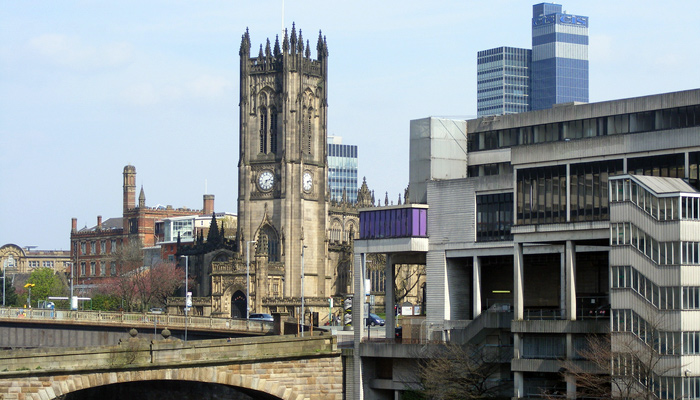Manchester

Manchester offers events, attractions and fine dining. Not to mention some of the best football in the world. Be sure to drop by the world famous Chester Zoo and taste real ale in one of the city's many pubs.
Manchester is a city and metropolitan borough in Greater Manchester, England. According to the Office for National Statistics, the 2010 mid-year population estimate for Manchester was 498,800. Manchester lies within one of the United Kingdom's largest metropolitan areas; the Greater Manchester Urban Area has a population of 2.2 million, whilst the metropolitan county of Greater Manchester has an estimated population of 2.6 million. The demonym of Manchester is Mancunian and its local authority is Manchester City Council.
Manchester is situated in the south-central part of North West England, fringed by the Cheshire Plain to the south and the Pennines to the north and east. The recorded history of Manchester began with the civilian settlement associated with the Roman fort of Mamucium, which was established in c. 79 AD on a sandstone bluff near the confluence of the rivers Medlock and Irwell. Historically, most of the city was a part of Lancashire, although areas south of the River Mersey were in Cheshire. Throughout the Middle Ages Manchester remained a manorial township, but it began to expand "at an astonishing rate" around the turn of the 19th century. Manchester's unplanned urbanisation was brought on by a boom in textile manufacture during the Industrial Revolution, and resulted in it becoming the world's first industrialised city. An early 19th-century factory building boom transformed Manchester from a township into a major mill town and borough that was granted city status in 1853. In 1894 the Manchester Ship Canal was built, creating the Port of Manchester.
The city is notable for its culture, music scene, scientific and engineering output, media links and sporting connections. Manchester's sports clubs include Premier League football teams, Manchester City and Manchester United. Manchester was the site of the world's first railway station, and the place where scientists first split the atom and developed the first stored-program computer. Manchester is served by two universities, including the largest single-site university in the UK, and has one of the country's largest urban economies. Manchester is also the third-most visited city in the UK by foreign visitors, after London and Edinburgh, and the most visited in England outside London.
Manchester experiences a temperate maritime climate, like much of the British Isles, with warm summers and cold winters. There is regular but generally light precipitation throughout the year. The city's average annual rainfall is 806.6 millimetres (31.76 in) compared to the UK average of 1,125.0 millimetres (44.29 in), and its mean rain days are 140.4 per annum, compared to the UK average of 154.4. Manchester however has a relatively high humidity level, which optimised the textile manufacturing (with low thread breakage) which took place there. Snowfalls are not common in the city, due to the urban warming effect. However, the Pennine and Rossendale Forest hills that surround the city to its east and north receive more snow and roads leading out of the city can be closed due to snow. notably the A62 road via Oldham and Standedge, the A57 (Snake Pass) towards Sheffield, and the M62 over Saddleworth Moor.